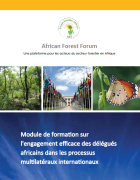A recent assessment by the African Forest Forum on the participation of African negotiators in international multilateral processes on forests and related issues revealed that a great majority of the African forest experts have not participated in any international negotiations, have never experienced agenda item writing and discussion, nor had experience in searching for funds for travel and participation in negotiations. However, a majority expressed the desire to have experiences in negotiations, especially in the acquisition of negotiation skills and to overcome the kind of challenges that are seen as hindering the right acquisition of skills in negotiations and the paucity of successful negotiators from Africa.
Based on these indications a draft training manual has been designed. It is presented in 3 parts. The first part summarises the theory of negotiation considering the essential elements of negotiations, the kinds of skills needed in negotiations, how to build these skills, basic steps and characteristic attributes of a good negotiator. The second part considers in-depth processes involved in negotiations in multilateral environmental agreements (MEAs) and other agreements which also look at the basics of MEA negotiations including issues such as governance, national and group negotiation positions, the plenaries, working groups and High Level Segment. The final part considers the Collaborative Partnership on Forests (CPF) membership and their roles and contributions to promote forest issues, among others.
It is established from these analyses that for successful negotiations, various roles are required to be performed by countries and their representatives. Country Parties and members together with their member representatives have obligations to make adequate preparations, select participants carefully based on merit using their own criteria but usually basing the selection of participants on their ability and readiness to negotiate. Parties and members are required to guarantee funding through appropriate budgetary allocations. The participants have obligation to properly and fully represent these Parties, institutions and organizations. The negotiations and the negotiators are governed by a code of conduct which is enshrined in the agreed rules of procedure that are usually part of the negotiation documents. The expectations are that all participants will negotiate in an atmosphere of peace, understanding and cordiality with the ultimate aim of generating win-win outcomes that are based on compromises and mutual respect which promote the prevalence of consensus building.

